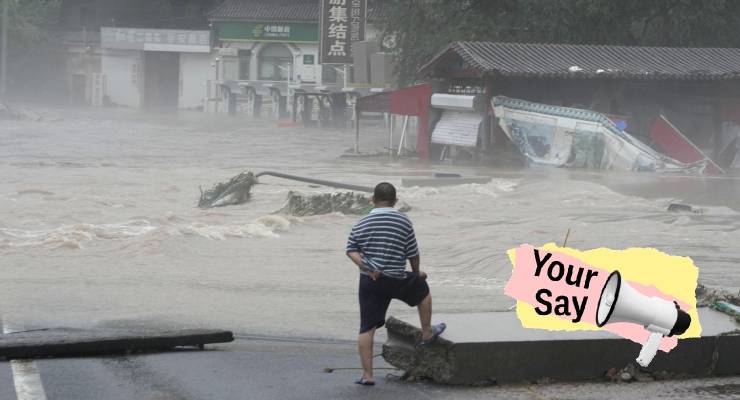
John Nightingale writes: The world of big business, engineering and consulting (of course), etc, will profit greatly from all the reconstruction and modifications required to repair the damage (“Who pays for climate damage when energy companies are making huge profits?”).
Imagine all the work protecting the great cities from rising sea levels! Moving more cities than just Jakarta to higher ground. Pumping more water out of land becomes polder. Then the rapid investment in geotechnical “solutions” to higher temperatures… The list of profit opportunities is endless.
Roger Clifton writes: What price a burning world (“Humanity’s headstone is built, only its epitaph awaits”)? For many years, conservative voices have asserted that nuclear is unnecessarily expensive in a country that has bountiful fossil fuels. Leftist voices assert that nuclear is more expensive than renewables, but when a decent carbon tax is applied to its gas back-up, it is renewables that become the more expensive.
As the only non-fossil fuel, uranium need not become expensive. Currently it is cheaper to burn only half a per cent of freshly mined uranium than to recycle used fuel and burn the lot. Increased demand for fuel would make recycling profitable, not costly. We are long overdue for a mass rollout of nuclear electricity, worldwide. Continuing fossil fuels would cost the world.
Jim Spithill writes: Maybe the missing inscription on humanity’s headstone could be this line from Alexis Wright’s new book, Praiseworthy: “This moment in time when the speedily man-made warming planet went psycho.”
Sandra Bradley writes: Although this article highlights the current state of our environment, we can do without the hyperbole and sensationalism. What it fails to provide is what the author thinks 9 billion people on the planet are supposed to do.
As a retired but still interested scientist, I can guarantee that nature will adapt to the way we behave with the planet’s resources. But whether we can adapt is more to the point. For example, I am in the northeast of the United States and have been trapped indoors for most of the summer because if it isn’t the heat and humidity, it’s the Canadian wildfire smoke that comes in to fill the gap when the rain has gone.
As an asthmatic, I can’t stay outside for long so my air-conditioning is running non-stop to keep the house de-humidified. As an individual, I could mitigate energy use with more friendly forms of power if the US was set up better for it — but neither the US nor Australia has devoted the resources required for the national energy grid to better use wind, water and sun.
Yes, we must do better, but as McGregor suggests, our lifespans are so short that as individuals we can do only so much. I have done my bit while living in Australia: no children, solar energy, hybrid vehicle, self-sufficient garden, volunteer nature and bush management. Not much more I can do other than die earlier than most people do today.
Hrisanthi Dokos writes: Is there climate hope? McGregor’s dire prediction of an apocalyptic dystopian future reminds me of Mad Max. We all joked about how impossible a future like that would be. But the reality is that over my lifetime — I’m 57 — I have watched the world and its climate slowly crumble. Our world is built on the greed of those who are in power.
Do I agree there is no climate hope? Yes. If I had a crystal ball when I decided to have kids, I believe I would have chosen not to have them. They are millennials. All I’ve witnessed in their lifetime is the continual destruction of our planet fuelled by the greed of the rich who fuel the greed of everyone else: materialism and consumption are now the opiate of the masses.
Hope for humanity? We are but one species on this planet and in the name of growth, progress and development we are destroying the other species and ourselves. As a species we will eventually become extinct but the planet will survive. Mother nature is a wonderful thing.
Paulette Jones writes: I hate how dumb we’ve been in Australia. We have been played by corporations desperate to hold on to the status quo, afraid of losing profit share, who shamelessly court politicians who have shamelessly held the line with the spectre of hellfire from media quarters ready to pounce at the slightest tinge of green.
I’m embarrassed to think how our past few decades will read in the history books. This is not a democracy when even children can understand we are on a dangerous path with no power to change direction.
Steve Brennan writes: I’ve been an activist for climate action for about four years. I’m in South America and can confirm the ocean temperature of the Pacific has warmed considerably. Marine life is dying — seals are making their way to the beach to die. I’ve never seen anything like this in the 23 years I’ve been coming here. We are officially in winter, but it’s really like summer.
I ask myself constantly what rapid solutions we need to halt the seemingly inevitable. To have any hope of saving humanity and life as we know it, we must stop pumping so much CO2 into the atmosphere. But that the governments of the big emitting countries and the fossil fuel giants are somewhat inseparable is without doubt part of the problem. There needs to be a worldwide movement to split this marriage and immediately stop subsidising this industry to what I understand is worth more than $2 trillion globally.
Also, we all must understand the impact our lifestyles have on global warming: all those ships on the oceans, trucks on the roads and planes in the sky carrying the stuff we buy. Many more people will die or be dispossessed. Whether humanity will save itself is really up to every person taking this problem deadly seriously.
Richard Ruffin writes: McGregor’s article provides a good summary of the ineffective action by the current (and, of course, the previous) government to the global warming emergency. The level of obfuscation, what appears to be gross ignorance of decades of climate science, and the dismissive response to the public’s concern for their grandchildren’s future are so gross that there needs to be a royal commission into the lack of effective government action.








Tell your “favourite” Labor politician to back David Pocock’s Duty of Care legislation.
Already did, and signed his petition.
A large proportion of todays problems stem from ‘forced’ consumerism. I remember reading a “Mad” magazine around 1973 where it mocked planned obsolescence, tissues that disintegrated when you blew your nose making you buy more, soap with a hard shell, but a soft center that melted away quickly causing the consumer to buy more and more soap. Toothpaste tubes full of air etc. I chuckled at the notion of planned obsolescence back then, but that very scenario materialised before my eyes over the next couple of decades.
Today, products are entirely designed not to last. Practically everything has unnecessary circuit boards in them with are often the cause of early failure, from toasters to washing machines. And don’t get me started on cars. Today’s cars are practically computers on wheels firstly and a means of transport comes in second place. Forget about your handy-hubby fixing it in the back yard. Better have good roadside assist because it’s not a matter of ‘IF’ it’ll stop due to electrical component failure, it’s a matter of inevitability. Probably too late to expect Governments (especially our own) to do anything about planned obsolescence. They want you to spend, spend, spend. To hell with the grandkids futures.
Of course little of this concerns my sister who is still using the fridge my mother bought in 1962. No silicon chips in that beauty. Same with her washing machine, bought only a decade after the fridge and whilst I realise that planned obsolescence is only part of a bigger picture of greed and corruption, it’s about time people started talking about it.
The champions are the car battery manufacturers. They have managed to make it so the battery will fail within hours of the warranty expiring. Pure technological genius.
The last comment mentions the ineffective actions of this govt and the previous one. Include also the next govt.
Unless it’s Green
Or just held the balance of power? Spread the word.
“materialism and consumption are now the opiate of the masses” – indeed, and the plague of obese ‘utes’ is their symbol.
People keep asking “what can we do?”
Basically, not much except to plan for the aftermath – assuming our highly adaptable species can survive at all.
Educate those around you as much as possible – if they don’t want to talk about it, then they’re not ready to learn and may never be.
We can’t stop the powerful and wealthy from continuing the planet on this path to destruction and in my opinion it’s already too late to stop it. However it is highly likely that enough of us will survive to build and new civilisation that respects the natural world rather than exploiting it.
That’s it.
No effective action can be taken to stop global warming as the tipping point was when the Siberian & Canadian permafrost began thawing, releasing the far more deleterious GHG methane – as well as many exciting & previously unknown pathogens long extinct from the biosphere, having killed off their previous hosts.
The much traduced Bjorn Lomborg, an accomplished statistician – like actuaries, statisticians tend to believe numbers, not fuzzy comfy drivel – has been pleading for people to face this fact for decades and adapt which, ironically would be orders of magnitude cheaper than the ineffectual demands made by the rich & powerful who have managed to co-opt those in the pampered West that changing light bulbs & buying EVs will reduce CO2 output.
If nobody ever lit another match the amount of CO2 already in the atmosphere will not begin to dissipate for decades and that ain’t gonna happen so long as this simple fact is ignored.